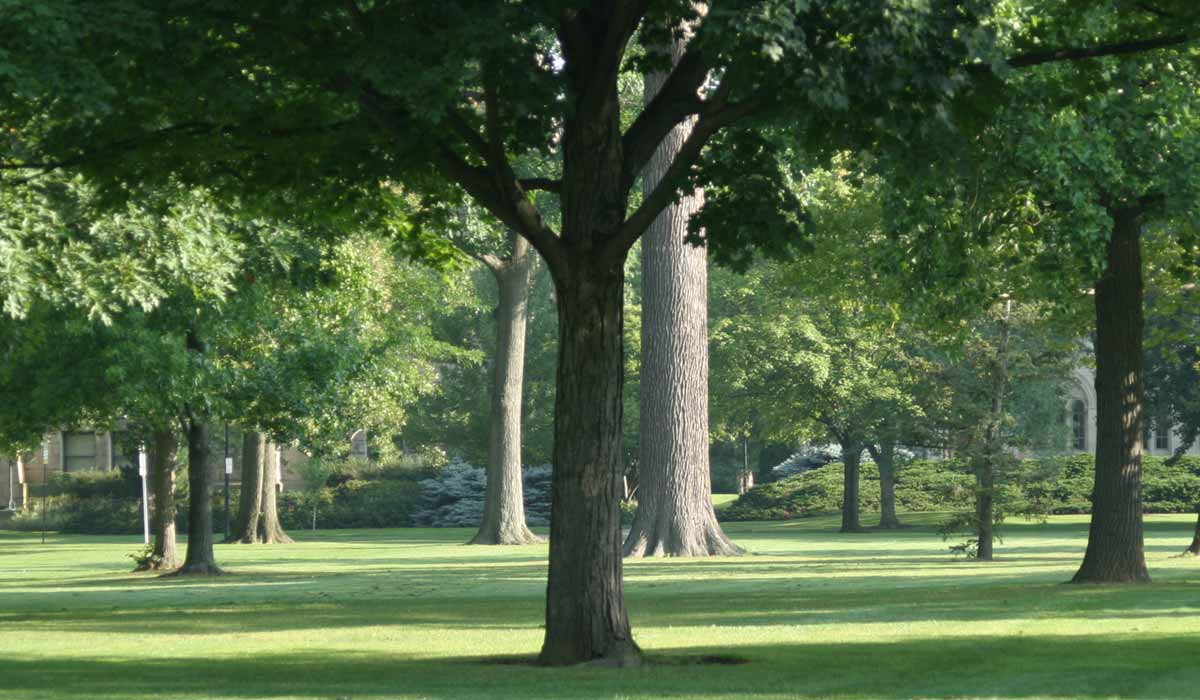The City of Oberlin and Oberlin College are leading by example in their commitments to reduce carbon emissions internally. As a member of ICLEI-Local Governments for Sustainability, the City of Oberlin has committed to completing a five-milestone process leading to carbon neutrality. As of 2011, the City has completed the first three milestones by conducting a baseline greenhouse gas emissions inventory, setting carbon emissions reductions targets, and adopting a climate action plan. As the first of its peer institutions to sign the American College and University Presidents' Climate Commitment, Oberlin College has led the way in establishing comprehensive sustainability planning and practice. These commitments have paved the way for the City's and College's participation in the Clinton Foundation Climate Positive Development Program.
Climate Action Plan, City of Oberlin, 2011
Commitment to:
- Reduce carbon emissions 50% by 2015, 75% by 2030, and 100% by 2050
- This plan lays out current and planned initiatives for achieving these goals
- Create a committee to create a comprehensive roadmap for achieving these goals with a revised Climate Action Plan drafted by the end of 2012
2025 Strategic Plan, City of Oberlin, 2011
Commitment to Strategic Priority: Lead With Sustainable Practices
- Continue and expand Sustainable Practices
- Adopt code changes to encourage more green buildings
- Set goals to end carbon emissions and the mechanisms to achieve those goals
- Expand and improve safe pedestrian travel
- Support expansion of farmer???s market, community gardens, local food production, and food storage
- Increase Multi-Modal Transportation Options
AASHE's Sustainability Tracking, Assessment and Rating System (STARS), Oberlin College, 2010
Commitment to:
- Submit for a STARS rating within one year
- Regularly disclose progress on STARS categories
Clinton Foundation Climate Positive Development Program, City of Oberlin, Oberlin College, 2010
Commitment to:
- Reduce net GHG emissions below 0 (Emissions Goals)
- Contribute towards restoration of natural systems (Ecological Goals)
- Collaborate with local, national, and international partners to be a model of Climate Positive Development
- Co-develop a collaborative workplan with CCI
Plan to be Carbon Neutral, Oberlin College, 2009
Commitment:
- Carbon neutral by 2025
- Includes specific recommendations for achieving carbon neutrality
Green Building Policy, City of Oberlin, 2007
Commitment:
- New construction and renovations will be LEED Silver or better
ICLEI-Local Governments for Sustainability, City of Oberlin, 2007
Commitment to five milestones:
- Conduct baseline GHG emissions inventory
- Adopt emissions reduction target for forecast year
- Develop local Climate Action Plan (CAP)
- Implement polices and measures outlined in CAP
- Monitor and verify results
American College & University President's Climate Commitment, Oberlin College, 2006
Commitment to:
- Complete emissions inventory
- Develop Climate Action Plan (target date, interim target, actions, track progress)
- Take immediate steps to reduce GHG emissions by choosing from list of short-term actions (see ACUPCC website)
- Integrate sustainability into curriculum and make it part of educational experience
- Make action plan, inventory and progress publicly available
Green Building Policy, Oberlin College, 2006
Commitment:
- New construction and major renovations will be LEED Silver equivalent or better
Strategic Plan, Oberlin College, 2005
Commitment to:
- Reduce rate at which the College contributes to the depletion and degradation of natural resources, increase the use of renewable resources, consider other measures that can enhance the physical environment we live in.
- Develop and implement state-of-the-art standards for building design, construction, and performance, and for land use.
- Work toward environmentally sound as well as aesthetically pleasing means of maintaining the physical plant, the landscape, and their surroundings.
- Enhance and develop opportunities for students and faculty to participate in ???greening" of the campus and the wider community through course work, independent research, and community service.
Environmental Policy, Oberlin College, 2004
Commitment to:
- Reduce the rate at which Oberlin College contributes to the depletion and degradation of natural resources
- Increase the use of renewable resources
- To consider other measures that can enhance the physical environment in which we live
- Priorities and decisions regarding energy production and use, the use and development of our grounds, facilities construction, modernization, maintenance, transportation, and materials use will be informed by the environmental impact they have.
This document also includes comprehensive commitments in sectors of Energy Production and Use; Facilities Construction, Modernization, and Maintenance; Transportation; Grounds; Purchasing, Reuse, and Disposal; and Implementation.
Sustainability Policy, City of Oberlin, 2001
Commitment to:
- Support a stable, diverse and equitable economy
- Protect the quality of the air, water, land and other natural resources
- Conserve, where possible, and enhance ecosystems
- Minimize adverse human impacts on local, regional and worldwide ecosystems
- Concept of sustainability and long-term impact will guide City policy and actions
- Lead by example, develop strategies, and seek community partnerships for implementing sustainable practices
- Maintain and protect historic character of Oberlin while supporting public spaces that protect the natural environment
- Encourage local production of goods and services
- Minimize production and disposal of materials which degrade the quality of the atmosphere, the soil and water
- Promote and maintain quality housing for all citizens
- Support land-use and transportation designs that support pedestrian or non-motorized modes of travel
- Promote energy efficiency and resource conservation
- Ensure inequitable burdens not placed on any one geographic area of socioeconomic sector of community
- Facilitate citizen participation
Learn about progress made towards these commitments in renewable energy and energy efficiency or visit the Oberlin College Office of Environmental Sustainability for a comprehensive overview of initiatives, policies, and progress at Oberlin College.










